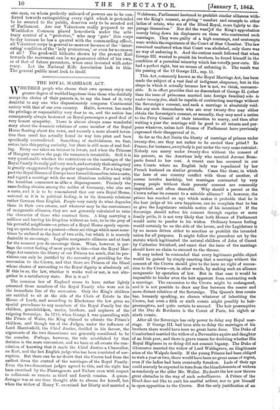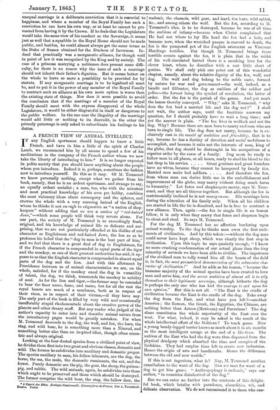THE ROYAL MARRIAGE ACT.
WHETHER people who choose their own spouses enjoy any greater degree of wedded happiness than those who dutifully accept the choice of their parents is, to say the least of it, very doubtful to any one who dispassionately compares Continental society with that of our own country. Habit, however, has made the privilege or responsibility very dear to us, and the nation has consequently always bestowed on Royal personages a good deal of very honest sympathy. There is almost always some wonderful story about the domestic relations of some member of the Royal House floating about the town, and recently a more absurd inven- tion than usual has actually found its way into print and been specifically contradicted. Something of snobbishness, we fear, enters into this prying curiosity, but there is still more of real feel- ing. Every one takes an interest in lovers, and when the Princess of Hungary marries the page the romance is irresistible. Still it is very questionable whether the restrictions on the marriages of the Royal Family do really gall very much, and certainly their stringency is greatly exaggerated by the popular apprehension. For along time past the Royal Houses of Europe have formed themselves into a caste, and regard a marriage with the most illustrious nobility and with the humblest commoner as alike a disparagement. Precisely the same feeling obtains among the nobles of Germany, who also are a caste, and it is to be remembered that our own Royal House, national as it is in political feeling, is in its domestic relations rather German than English. People very rarely do what degrades them in their own esteem, and whatever may be the convenience of morganatic alliances, they are not generally calculated to raise the character of those who contract them. A king marrying a milliner and leaving his kingdom without an heir, to be the prey of his powerful neighbours—a prince of a Royal House openly espous- ing an opera-dancer or a peasant—these are things which must some- times be endured as the least of two evils, but which it is scarcely desirable to encourage. Legalize morganatic alliances and at least for the moment you do encourage them. What, however, is per- haps the secret feeling of most people is this—that the Royal Mar- riage Act restricts the liberty of our Princes too much, that its pro- visions can only be justified by the necessity of providing for the succession to the Crown, and that there are Princes of the Blood whose chance of succeeding to the Royal dignity is absolutely nil. If this be so, the law, whether it works well or not, is not alto- gether in a satisfactory state. But is it so ?
The common law of England seems to have rather lightly esteemed those members of the Royal Family who were not in the immediate line of the succession. Only the King's children are entitled to sit at the side of the Cloth of Estate in the House of Lords, and according to Blackstone the law gives no special precedence to any members of the Royal Family but the children, grandchildren, uncles, brothers, and nephews of the reigning Sovereign. In 1718, when George I. was quarrelling with the Prince of Wales, the King claimed to educate the Prince's children, and though ten of the Judges, under the influence of Lord Macclesfield, the Chief Justice, decided iu his favour, the arguments of the two dissentients are generally considered to be the sounder. Perhaps, however, the rule established by that decision is the more convenient, and we have at all events the con- solation of knowing that it made the Chief Justice a Chancellor, an Earl, and the last English judge who has been convicted of cor- ruption. But there can be no doubt that the Crown had from the earliest times the control of the marriages of the Royal Family. Even the two dissentient judges agreed to this, and the right has been exercised by the Plantagenets and Tudors even with respect to collaterals so remote as third and fourth cousins. A queen- dowager was at one time thought able to choose for herself, but when the widow of Henry V. exercised her liberty and married a Welshman, Parliament hastened to prohibit similar alliances with- out the Ring's consent, as giving " comfort and example to other ladies of estate, who are of the Blood Royal, more lightly to dis- parage themselves." Nor did the want:of the King's approbation merely bring down his displeasure on those who contracted such marriages. They were guilty of a high contempt, and contempta were within the cognizance of the Court of Star Chamber. The law remained unaltered when that Court was abolished, only there was no way of enforcing it. And the curious result followed that when George IIL wanted to punish his brothers, he found himself in the condition of a parochial minority which has voted!a poor-rate. He had a perfect right, but no means of enforcing it. The result was the passing of the 12 George III., cap. 11.
This Act, commonly known as the Royal Marriage Act, has been made the subject of a vast deal of indignant. eloquence, but in the shape in which it actually became law is not, we think, unreason- able. It in effect provides that no descendant of George IL (other than the issue of princesses married into foreign families) who is under twenty fine, shall be capable of contracting marriage without the Sovereign's consent, and such a marriage is absolutely void. But any such descendants who are over twenty-five may either obtain the Sovereign's consent, or secondly, they may send a notice to the Privy Council of their intention to marry, and then after waiting a year the marriage will be good to all intents and pur- poses whatever, unless both Houses of Parliament have previously expressed their disapproval of it.
So far as the Act limits the liberty of marriage of princes under twenty-five, are they not rather to be envied than pitied? In France, for instance,.everybody is put under the very same restraint. Nobody can marry under twenty-five without the consent of his parents, as the American lady who married Jerome Bona- parte found to her cost. A recent case has occurred in our own Courts where an English lady was repudiated by her French husband on similar grounds. Cases like these, in which the laws of one country conflict with those of another, of course involve hardship, but marriages contracted by very young people without their parents' consent are commonly imprudent, and often shameful. Why should a parent or the Crown refuse its consent to a suitable alliance? If, however, the prince has reached an age which makes it probable that he is the best judge of his own happiness, can he complain that he has to give the Legislature suitable notice of his intention? If the Sovereign should refuse his consent through caprice or mere family pride, it is not very likely that both Houses of Parliament world unite to pander to his wishes. Ordinary human feeling would certainly be on the side of the lovers, and the Legislature is by no means driven either to sanction or prohibit the intended union for all purposes. It might follow the precedent set by the statute which legitimated the natural children of John of Gaunt by Catherine Swinford, and enact that the issue of the marriage should have no claim to succeed to the throne.
It may indeed be contended that every legitimate public object would be gained by simply enacting that a marriage without the consent of the Crown should give to the issue no right of succes- sion to the Crown—or, in other words, by making such an alliance morganatic by operation of law. But in that case it would be impossible to binder even the heir apparent from contracting such a marriage. The succession to the Crown might be endangered, and it is not possible to draw any line between the nearer and more distant relatives of the Sovereign. The Queen's first cousin has, humanly speaking, no chance whatever of inheriting the Crown, but even a fifth or sixth cousin might possibly be heir- presumptive, and quite certain to succeed. The heir presumptive of the Due de Bordeaux is the Count of Paris, his eighth or ninth cousin.
After all the Sovereign has only power to delay any Royal mar- riage. If George III. had been able to delay the marriages of his brothers there would have been no great harm done. The Duke of Cumberland married the widow of a Devonshire squire and daughter of an Irish peer, and there is grave reason for doubting whether His Royal Highness in so doing did not commit bigamy. The Duke of Gloucester married the widow of Lord Waldegrave, an illegitimate scion of the Walpole family. If the young Princes had been obliged to wait a year or two, there would have been no great cause of regret, even if the ladies had been eventually forsaken. Lads of their age could scarcely be expected to turn from the blandishments of widows as resolutely as the elder Mr. Weller. No doubt the law now throws great obstacles in the way of such misalliances. A Prince of the Blood does not like to curb his marital ardour, nor to put himself in open opposition to the Crown. But the only justification of an unequal marriage is a deliberate conviction that it is essential to happiness, and where a member of the Royal Family has such a conviction he can have his own way, or at least he cannot be pre- vented from having it by the Crown. If he feels that the Legislature would take the same view of his conduct as the Sovereign, it seems just as well that a squabble in the Royal House should not be made public, and besides, he could almost always get the same terms as the Duke of Sussex obtained for the Duchess of Inverness. In- deed that practically was a morganatic alliance, for though void in point of law it was recognized by the King and by society. The case of a princess marrying a nobleman does present some diffi- culty, for there is no reason why the issue of such a marriage should not inherit their father's dignities. But it seems better on the whole to leave so mere a possibility to be provided for by statute. If any morganatic marriage is to be legalized all must be, and to put it in the power of any member of the Royal Family to contract such an alliance at his own mere option is worse than the existing state of things. Nor does it seem possible to avoid the conclusion that if the marriage of a member of the Royal Family should meet with the express disapproval of the whole Legislature, it would be either disgraceful in itself or dangerous to the public welfare. In the one case the illegality of the marriage would add little or nothing to its discredit, in the other the princely personage is only asked to subordinate his feelings to his duties.





































 Previous page
Previous page